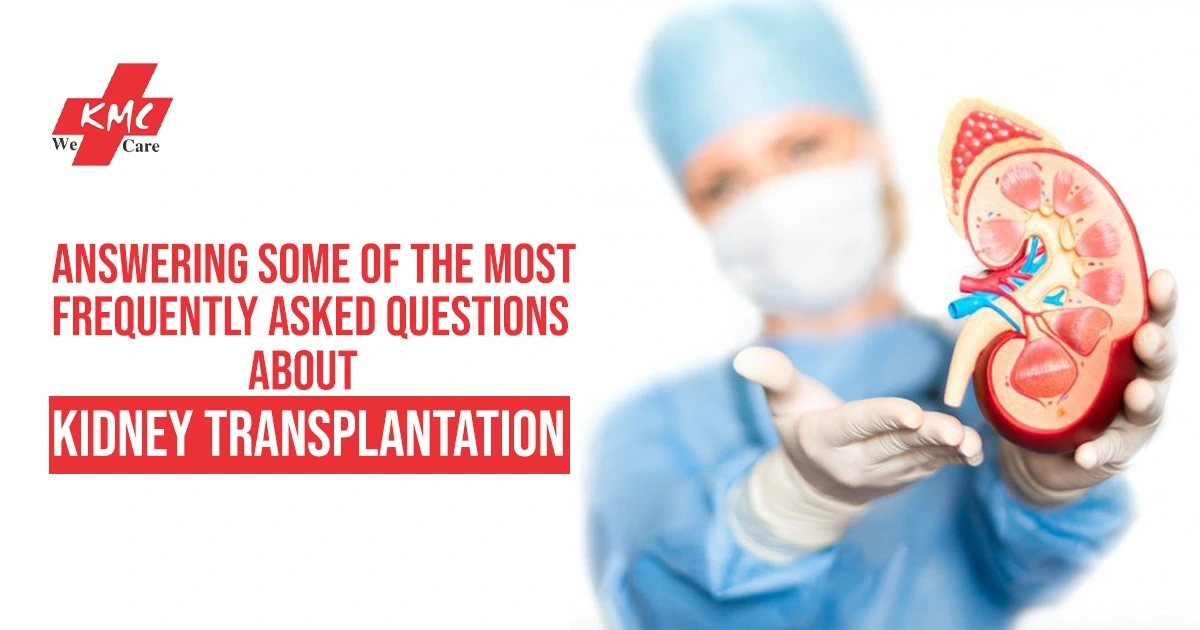Can I live a full life with only one kidney? This is the most often-asked question among donors.
Well, the answer to it is yes! Yes, you can live a regular, healthy life with only one kidney.
Similarly, there are many more questions that an individual can have about kidney donation and transplant.
One of the most significant obstacles to this life-saving therapy is societal misperception and a lack of information.
Thus in today’s blog, we have compiled a list of some of the most frequently asked questions and provided answers based on genuine facts, so without wasting much time, let us head over to the questions.
If I Donate One Kidney, Will I Always Need to Take Medicines Because I’ll Have Chronic Health Problems?
Kidney donors are only given drugs to help them recuperate after surgery. There is no evidence to suggest that kidney donation will cause ongoing health problems.
At KMC Hospital, we accept donors only after a comprehensive medical evaluation and we also give frequent post-operative follow-ups.
When Do You Need a Kidney Transplant?
Kidney transplantation is recommended only for individuals with Chronic Kidney Disease (CKD) Stage 5 or End Stage Renal Disease (ESRD).
In such cases, both of their kidneys quit working owing to permanent injury. In such cases, the treatment choices include lifelong dialysis or kidney transplantation.
Is There an Ideal Time for Kidney Transplantation?
A kidney transplant is suggested when kidney function falls below 50%. It has been shown that patients who get kidney transplants before dialysis (known as pre-emptive transplantation) do better than dialysis patients.
Is Bed Rest Necessary for The Donor After Surgery?
Well, there is a recuperation period, which is determined by the individual’s health. However, after healing, the donor can walk freely while being discharged from the hospital.
Is Kidney Transplant Better Than Dialysis?
According to surveys, those who get kidney transplants often live longer than dialysis patients. That’s because transplantation allows people to avoid the adverse effects of dialysis, resulting in a higher quality of life.
They also have fewer food and lifestyle limitations, whereas dialysis patients must follow a rigid set of Dos and Don’ts.
Furthermore, the cost of a kidney transplant is far cheaper than the expense of lifelong dialysis.
Can a Female Donor Become Pregnant Naturally After Donation?
Donating a kidney has no effect on the conceiving and birthing process. In fact, after the healing period is completed, female donors can begin preparing for pregnancy.
Will I Have Dietary Restrictions After a Kidney Donation?
Well, there are no unique rules that you will have to follow throughout your life. However, being the top hospital in Dehradun, we constantly encourage everyone to follow a healthy, balanced diet in order to live a healthier life.
Can I Donate a Kidney to Someone Despite the Fact That Our Blood Groups Do Not Match?
Yes, you can. This operation is known as ABO Incompatible Kidney Transplantation.
The receiver/patient will need to undergo an additional operation known as plasmapheresis or immunoadsorption. This is done to remove the antibodies from the blood.
Can I Still Play Sports or Engage in Outdoor Activities After Donating One Kidney?
Yes, you can actively engage in outdoor activities after donating one kidney. However, we recommend a 4-6 week recuperation period following surgery before returning to routine sports and fitness activities.
I’m a Senior Citizen; Can I Donate Kidneys?
We welcome donors over the age of 18, and there are no age limitations as long as you are in excellent health and meet the medical standards.
Will Donating Put Me at Risk for Kidney Diseases?
This is not correct. If you live a healthy lifestyle, you are unlikely to develop kidney disease as a result of donating one.
I Have Diabetes; Can I Also Have a Kidney Transplant?
Of course! Diabetes is one of the most prevalent causes of renal failure. As a result, diabetes is never a reason not to have a kidney transplant.
What Are the Risks of Receiving a Kidney Transplant?
Kidney transplant is without a doubt a significant procedure with various dangers, including anesthesia difficulties, bleeding, infection, and so on.
However, being one of the leading hospitals with highly skilled specialists, we ensure that you do not encounter any such difficulties.
So these are some of the most common questions that almost every kidney patient seeks answers to. We hope that by answering these questions, we’ve cleared your concerns. However, if you’re still left with any query then make sure to contact us at KMC Hospital.
At KMC Hospital, we provide our patients with comprehensive care. We have equipped our center with all the modern and latest diagnostic equipment and the top nephrologists in the country to provide the most advanced pre-operative assessment, dialysis assistance, and comprehensive post-surgery treatment for kidney problems.

